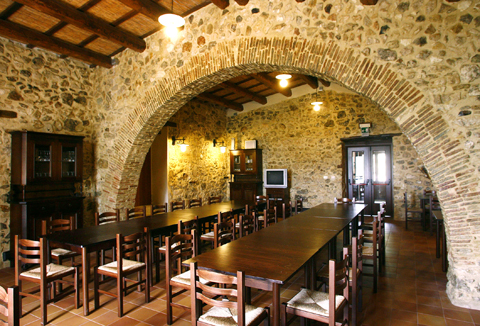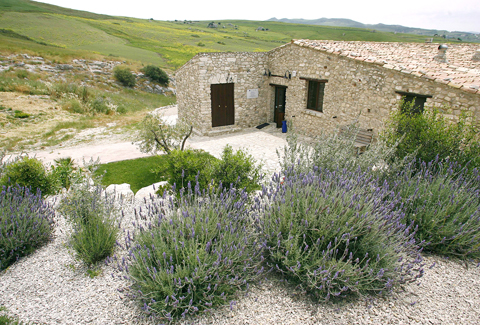Here’s an offer that may not be so hard to refuse: a few nights’ stay at the former hideout of a ruthless mafia boss near the town that partly inspired The Godfather books and films.
Not sold on a break in blood-stained land?
Consider this: There’s no more sleeping with the fishes, as the Sicilian saying goes.

PHOTO: AFP
The property, which includes the sheep pen where imprisoned mafia chief Salvatore “Toto” Riina once hid out, has been transformed into a rustic bed-and-breakfast in the heart of western Sicily and given a new name, Terre di Corleone, or Land of Corleone.
It forms part of a list of former mafia assets seized by Italian authorities and recently turned into holiday spots, vineyards or olive oil factories, giving new life to lands tainted by violence and crime.
There’s no hint that one of the clan’s grislier murders of the 1990s was carried out not far away, when Riina’s right-hand man, Giovanni Brusca, strangled the young Giusepppe di Matteo then dissolved his body in acid to punish the teenager’s father for turning state’s witness.

PHOTO: AFP
Consider another project about 20km down the road, where a sign reading “mafia-seized asset” greets clients of the “I Cento Passi” winery — named for a 2002 movie on the mafia killing of journalist Peppino Impastato.
“We are right outside of Corleone, and this fully planted vineyard proves that, starting out from nothing, we can produce excellence, a vine offering its most refined varieties,” Francesco Galante of the Libera association said.
Libera, an anti-mafia organization founded by a Catholic priest, the Reverend Don Ciotti, specializes in the remodeling of seized assets.
However, that job has not come without its risks.
“Creating jobs on mafia land puts us in a difficult position: We have been the object of some serious intimidation attempts, arsons and robberies,” Galante said. “It was meant to discourage us.”
Despite the challenges, those who have worked on such transformations, made possible by changes in Italian law, say they are worth the risk.
Police have long been allowed to seize assets from mafia members or businessmen with ties to organized crime simply on the basis of suspicion. But since 1996, such goods can be “reused for social aims.”
Italian Prime Minister Silvio Berlusconi’s government has stepped up seizures, using them as one of its main weapons in the fight against the country’s three large mafia syndicates.
Those three are the Cosa Nostra in Sicily, the Camorra around Naples and the ‘Ndrangheta in Calabria, the tip of the Italian peninsula.
Over the past two years, money than 15,000 seized assets such as buildings, villas, land and factories have added up to more than 10 billion euros (US$12 billion).
In Palermo, the Sicilian capital, one of the 1,700 real estate assets seized hosts the regional anti-mafia investigation unit (DIA).
Hitting mafia assets “is a complicated task because their holdings are often registered under the name of dummy corporations abroad or figureheads,” DIA head Elio Antinoro said.
Assets, however, are one of the bosses’ weak spots.
“Their power flows from their ability to pay salaries to their accomplices and families, or to pay for their legal defense once they are in jail,” said Rosolino Nasca, colonel at the local anti-mafia brigade.
The end result often provides a stark contrast between the evils once inflicted by organized crime figures and public-spirited projects.
Libera set up a horse-riding school on land formerly belonging to Brusca, and the center has been named after his young victim, Giuseppe di Matteo.
It has also opened shops — one in Palermo is in a building seized from an entrepreneur tied to the mafia — where it sells lentils, infusions or pasta from “mafia-free land.”
Customers can choose from two different kinds of olive oil: the version from olives grown on land once belonging to mafia syndicate Sacra Corona Unita or the variety from former Cosa Nostra property.

CHIP WAR: The new restrictions are expected to cut off China’s access to Taiwan’s technologies, materials and equipment essential to building AI semiconductors Taiwan has blacklisted Huawei Technologies Co (華為) and Semiconductor Manufacturing International Corp (SMIC, 中芯), dealing another major blow to the two companies spearheading China’s efforts to develop cutting-edge artificial intelligence (AI) chip technologies. The Ministry of Economic Affairs’ International Trade Administration has included Huawei, SMIC and several of their subsidiaries in an update of its so-called strategic high-tech commodities entity list, the latest version on its Web site showed on Saturday. It did not publicly announce the change. Other entities on the list include organizations such as the Taliban and al-Qaeda, as well as companies in China, Iran and elsewhere. Local companies need

CRITICISM: It is generally accepted that the Straits Forum is a CCP ‘united front’ platform, and anyone attending should maintain Taiwan’s dignity, the council said The Mainland Affairs Council (MAC) yesterday said it deeply regrets that former president Ma Ying-jeou (馬英九) echoed the Chinese Communist Party’s (CCP) “one China” principle and “united front” tactics by telling the Straits Forum that Taiwanese yearn for both sides of the Taiwan Strait to move toward “peace” and “integration.” The 17th annual Straits Forum yesterday opened in Xiamen, China, and while the Chinese Nationalist Party’s (KMT) local government heads were absent for the first time in 17 years, Ma attended the forum as “former KMT chairperson” and met with Chinese People’s Political Consultative Conference Chairman Wang Huning (王滬寧). Wang

CROSS-STRAIT: The MAC said it barred the Chinese officials from attending an event, because they failed to provide guarantees that Taiwan would be treated with respect The Mainland Affairs Council (MAC) on Friday night defended its decision to bar Chinese officials and tourism representatives from attending a tourism event in Taipei next month, citing the unsafe conditions for Taiwanese in China. The Taipei International Summer Travel Expo, organized by the Taiwan Tourism Exchange Association, is to run from July 18 to 21. China’s Taiwan Affairs Office spokeswoman Zhu Fenglian (朱鳳蓮) on Friday said that representatives from China’s travel industry were excluded from the expo. The Democratic Progressive Party government is obstructing cross-strait tourism exchange in a vain attempt to ignore the mainstream support for peaceful development

ELITE UNIT: President William Lai yesterday praised the National Police Agency’s Special Operations Group after watching it go through assault training and hostage rescue drills The US Navy regularly conducts global war games to develop deterrence strategies against a potential Chinese invasion of Taiwan, aimed at making the nation “a very difficult target to take,” US Acting Chief of Naval Operations James Kilby said on Wednesday. Testifying before the US House of Representatives Armed Services Committee, Kilby said the navy has studied the issue extensively, including routine simulations at the Naval War College. The navy is focused on five key areas: long-range strike capabilities; countering China’s command, control, communications, computers, cyber, intelligence, surveillance, reconnaissance and targeting; terminal ship defense; contested logistics; and nontraditional maritime denial tactics, Kilby